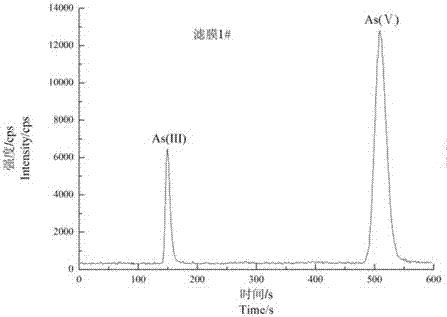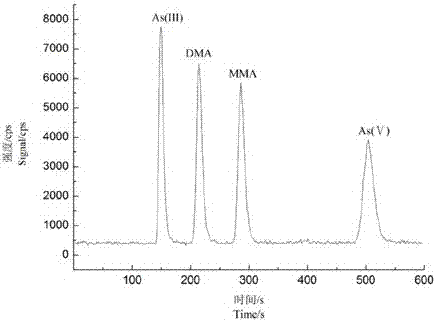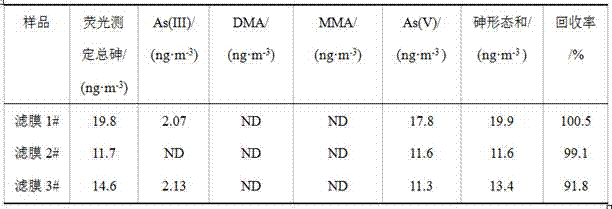A method for the separation and determination of arsenic in PM2.5
A determination method and arsenic speciation technology, applied in the field of detecting air pollutants, can solve problems such as limited research, and achieve the effects of low acidity, environmental friendliness and good precision of the extractant
- Summary
- Abstract
- Description
- Claims
- Application Information
AI Technical Summary
Problems solved by technology
Method used
Image
Examples
Embodiment 1
[0015] 1) Use 25cm*20cm glass fiber filter membrane for sampling;
[0016] 2) Cut 1 / 4 filter membrane into a 50 mL centrifuge tube, add 1% HNO 3 Solution 5mL, shake and mix well; transfer the solution into a polypropylene digestion tank for microwave digestion, digestion program: 55°C-10 min, 75°C-10 min, 90°C-30min, power set to 1200 W; cool down after digestion To room temperature, centrifuge the digestion solution at 5000 rpm for 10 min, take the supernatant into a 50 mL centrifuge tube, add 1% HNO 3 Dilute to 15 mL; store at -80°C until separation and determination by high performance liquid chromatography-inductively coupled plasma mass spectrometry;
[0017] Separation conditions: at 10 mmol L -1 NH 4 NO 3 , (NH 4 ) 2 HPO 4 The mixed solution was used as the mobile phase, and HNO 3 Adjust the pH to 6.2. The mobile phase passes through a 0.45 μm filter membrane to avoid polluting the sample separation column, and the speed of the mobile phase during the separatio...
PUM
 Login to View More
Login to View More Abstract
Description
Claims
Application Information
 Login to View More
Login to View More - R&D
- Intellectual Property
- Life Sciences
- Materials
- Tech Scout
- Unparalleled Data Quality
- Higher Quality Content
- 60% Fewer Hallucinations
Browse by: Latest US Patents, China's latest patents, Technical Efficacy Thesaurus, Application Domain, Technology Topic, Popular Technical Reports.
© 2025 PatSnap. All rights reserved.Legal|Privacy policy|Modern Slavery Act Transparency Statement|Sitemap|About US| Contact US: help@patsnap.com



